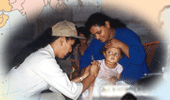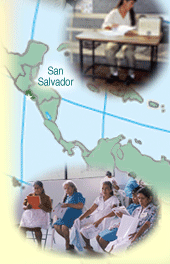
Ensuring a Healthier Future through SALSA
Beginning in 1998, PRIME I and PRIME II assisted the Ministry of Public Health and Social Welfare (MSPAS) through the USAID-funded SALSA project (Salvadoreños Saludables) to implement a national family planning and reproductive health (FP/RH) strategy. The plan focused on increasing the use of non-permanent FP methods and improving the quality and accessibility of FP/RH services delivered by primary-level health promoters and traditional birth attendants (parteras). PRIME trained 2,091 parteras and 1,578 community promoters in FP counseling, services and referrals; before the intervention neither cadre had distributed FP methods. Responsive training and learning approaches, supportive supervision and other on-the-job problem-solving approaches were used to strengthen and reinforce provider knowledge and skills.
SALSA also emphasized adolescent reproductive health, drawing upon a series of baseline studies and needs assessments conducted by PRIME II during 1999 and 2000 in three rural departments—La Paz, Sonsonate and Usulután—with high rates of adolescent pregnancy. Focus group discussions with adolescent women revealed perceptions of mistreatment by providers and a lack of knowledge of available services, compounded by a lack of confidentiality in health facility environments. In response, PRIME designed a pilot project with providers at the three regional hospitals to develop an adolescent-friendly approach to RH care. The hospitals formed clubs through which pregnant adolescents and young mothers receive weekly RH and maternal health education while learning practical skills such as knitting.
To reduce maternal mortality from unsafe abortion, PRIME II trained 35 doctors in postabortion care (PAC) and helped establish teams of doctors, nurses and health educators to update and strengthen PAC services at six regional hospitals. Training included technical updates on manual vacuum aspiration and instruction in family planning counseling.
Key Results: In samplings of 140 to 200 providers from each cadre, almost all promoters (99%) and 71% of parteras reported delivering FP methods in their communities, with condoms being the most widely distributed method; 65% of parteras and 51% of promoters achieved the minimum acceptable performance observation score (70%) in FP counseling. Qualitative data indicate that adolescent client satisfaction increased at the three hospitals participating in the adolescent RH pilot project. Pre- and post-intervention random sampling of 114 postpartum adolescents at one hospital showed that the percentage of adolescents who planned to space their next birth jumped from 38% to 70% and knowledge of condoms increased from 27% to 66%. While only 23% of PAC clients (n=1,453) at the six regional hospitals had used FP before receiving PAC services, 56% left the facility with a FP method.
|











